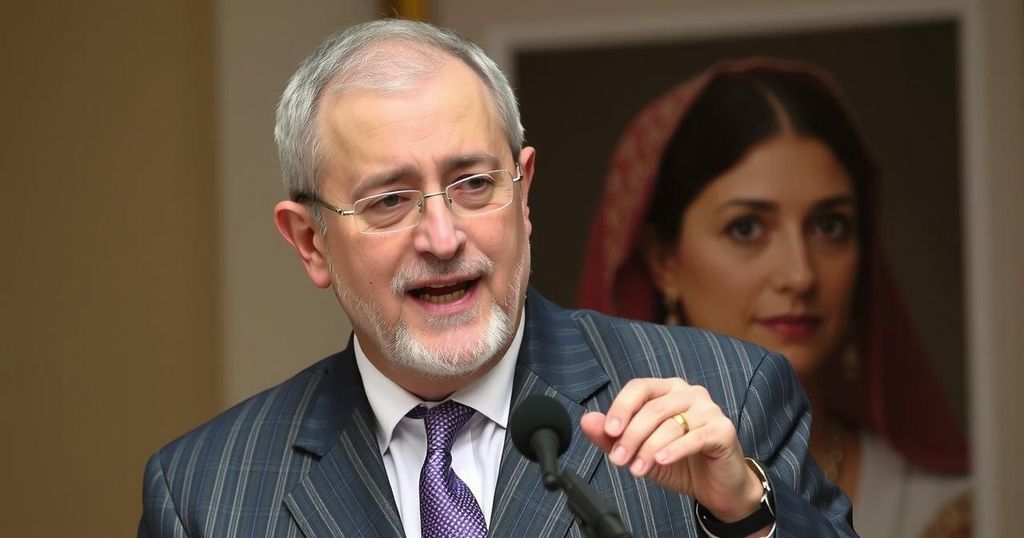Syria’s De Facto Leader Signals Potential Four-Year Electoral Timeline

Syria’s de facto leader, Ahmad al-Sharaa, announced that elections could take up to four years to organize, with a draft constitution expected to take three years. Following the overthrow of Bashar al-Assad, al-Sharaa’s interim government emphasizes infrastructure preparation and aims for international legitimacy through diplomatic engagements with various countries, including recent discussions with Ukraine and U.S. officials.
The de facto leader of Syria, Ahmad al-Sharaa, indicated that elections in the country may take up to four years to organize following the ousting of the Assad regime by his rebel group. In an interview, al-Sharaa, formerly known as Abu Mohammad al-Jolani and currently leading the Islamist group Hayat Tahrir Al-Sham (HTS), emphasized the necessity of establishing infrastructure before proceeding to elections. Furthermore, he stated that drafting a new constitution could take an estimated three years.
Al-Sharaa expressed that Syria is undergoing a “re-foundation” phase, necessitating a thorough reconstruction due to the devastation left by decades of autocratic rule. He remarked, “The opportunity that was given to us today doesn’t present itself every four or five years… the constitution must regulate society so that the previous experience does not repeat itself.” He also addressed HTS’s imminent dissolution, which will be discussed at the forthcoming National Dialogue Conference, though the date for this conference remains unannounced.
On regional geopolitics, al-Sharaa commented on the situation concerning Russia, emphasizing that the new leadership seeks a collaborative relationship with Moscow. Meanwhile, a Ukrainian delegation has recently met with him, highlighting the establishment of international relations despite al-Sharaa’s controversial history. The de facto leader, who previously faced a $10 million bounty issued by the United States, was informed by a high-level U.S. delegation that this bounty would be removed, reflecting a shift in diplomatic approach. Al-Sharaa has been actively pursuing international legitimacy and widening his diplomatic outreach to numerous countries, including Western powers and regional leaders.
Furthermore, al-Sharaa has signaled a readiness to engage constructively with Saudi Arabia and to reconsider ties with Iran, stating that the latter should “rethink its calculations about its interventions in the region.” These developments indicate a significant transformation in Syria’s political landscape following the downfall of the Assad regime, with al-Sharaa demonstrating a commitment to fostering new governance structures and cultivating international relations.
The recent political upheaval in Syria represents a significant shift in the nation’s governance, following the overthrow of Bashar al-Assad’s long-standing regime. This change has initiated a dialogue about the future of Syria, emphasizing the need for a structured electoral process. Ahmad al-Sharaa, the new leader of Hayat Tahrir Al-Sham, has begun to articulate plans for the country’s reconstruction and governance, including transitional processes such as drafting a new constitution and preparing for elections within a protracted timeline. The international community is keenly observing these developments, particularly in the context of regional power dynamics and brokered relationships among nations.
In summary, Ahmad al-Sharaa’s revelations about the electoral timeline and constitutional reforms in Syria underscore the transformative phase the country is entering following the ousting of the Assad regime. His leadership reflects a commitment to rebuilding and re-establishing Syria while fostering international relations and distancing himself from extremist affiliations. Although challenges remain, particularly regarding the immediate restructuring and stabilization of governance, the ongoing diplomatic engagements signal a new era for Syria and its place within regional and global contexts.
Original Source: www.cnn.com








